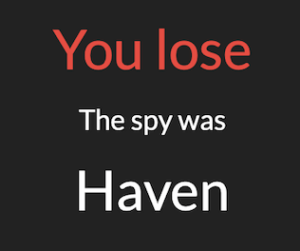Alexandr Ushan’s “Spyfall” is a 13+ card game which can be seen on store shelves courtesy of Hobby World, or played free online at Netgames.io. Similar to other games of social deduction like Mafia, Secret Hitler, or Among Us, Spyfall is a game of unilateral competition, whereby one “spy” must blend in with a group of players by feigning knowledge of a secret meeting location.
After playing it this past week, I would argue that much of the fun in Spyfall comes from simple mechanics which subvert the cooperative principles of typical social interaction, creating an atmosphere of suspicion where one must delicately balance ambiguity and specificity in order to win. At the same time, these simple mechanics are a double-edged sword. While they allow players to pick-up-and-play with minimal instruction, they also lead to fairly little novelty and replayability value.
In discussing the game’s mechanics, we can start with the players. Spyfall is a game of unilateral competition, and this creates a dynamic of mistrust from the moment the players are dealt their role card (i.e. Spy or Not Spy). In cases where I was the Spy, I would let out a little laugh or make a comment like “Oh this is a fun one,” to make it seem as though I was given the secret location. And when I wasn’t the Spy, I was hyper-aware of all the reactions my fellow classmates had as we played.

The objectives of the games were slightly different, depending on which role you played. For the Spy, you had to blend in by outwitting the other players. For the rest of the players, you had to blend in as well, while also probing to figure out who the Spy was. In this way, I felt that being the Spy had an easier win condition, which made sense from a design standpoint because they were outnumbered. The game was zero-sum, as either the Spy would win, or everyone else would.

Interestingly enough, I found that regardless of the role you were assigned, the challenge of the game was fairly similar. In other words, the main skill set of the game was to strike a balance between ambiguity and specificity. To illustrate this, we played a round where our secret location was “service station.” One player asked, “What made you stop at this location?” and another replied, “Food.” This answer was specific enough to suggest the player knew the location, and yet ambiguous enough that it might lead the Spy to believe we were meeting at a restaurant or grocery store. As the Spy, you could lean on this dynamic to give vague answers, which sometimes worked if the other players interpreted your answer favorably.

As for procedures and rules, there was a timer which added a layer of suspense as well as boundaries to the game. When the timer was on, the air of suspicion was present. However, once voting occurred, this dynamic melted away and we were back to typical conversation.
In my view, these mechanics combined to create interesting dynamics that helped contribute to the fun of the game. In typical conversation, the cooperative principle (also referred to as the Gricean maxims) leads us to give others the benefit of the doubt. When others are speaking, we assume they are generally truthful, and that they are not being excessively ambiguous. However, the mechanics of Spyfall throw this dynamic on its head, creating a situation where we must assume the opposite. This, in turn, leads us to try and outwit others, creating much of the fun that underlies the game.
However, aside from these mechanics, there was little else to the game. From a design perspective this can be a massive advantage, as I have seen many board games get thrown aside at group gatherings because they were too complex to learn. And yet, after five rounds or so, we remarked that the game was “getting old.” This is because while games like Secret Hitler and Among Us have more complexity and a narrative aspect to them, the gameplay of Spyfall is essentially the same every time. Even Mafia includes more variety by having a narrator, who can add in storylines or humor to help the game feel fresh each time.
Overall, Spyfall is a great choice for a quick and easy game of social deduction. While the simple mechanics and premise allow players to get straight to the gameplay, they also sacrifice some novelty and replayability value. Perhaps to remedy this, Spyfall could add booster packs (i.e. more roles, secret items or targets), to help supplement gameplay. In this way, Spyfall could reap the benefits of being a pick-up-and-play game, while also continuing to offer novelty for returning players.




